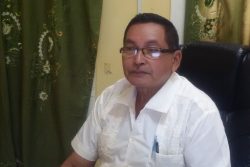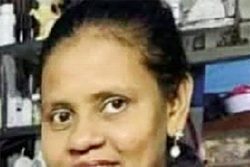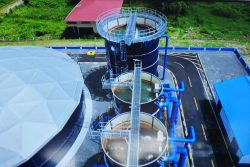Early last month President Irfaan Ali swanned into Den Amstel with various senior officials in tow and promised the assembled residents of the village, among other things, that the community ground would be rehabilitated. Included among those residents were members of the Neighbourhood Democratic Council, the local authority for the locality, although the President did not hold any encounter with them independent of his community outreach. The commitments he made were well received, but as is often the case in Guyana, somewhere along the line the inhabitants’ embrace of the proposals and the atmosphere of bonhomie which accompanied it morphed into something altogether more uncongenial, and in the case of the head of state, quite acid.
NDC Chairman Kenton Hilliman told this newspaper that Minister of Works Deodat Indar had “disrespectfully” begun the works on the community ground without consulting the Council on the matter. He had had the contractors, Messrs Clint Grimes and Darren Jordan begin work on digging up the ground to renovate the basketball court, and when Mr Hilliman discovered there was “unauthorized” work going on, some form of altercation between the Chairman and the contractors took place.
The NDC followed this up by placing padlocks on the gates to the ground, an act which apparently incensed the Minister in the Ministry of Works who arrived and promptly cut the locks. After this he went on the Ministry’s Facebook page accusing the Council of derailing a government development project by obstructing works in progress in the community. In addition, he gave an account of events derived only from the contractors, although according to the NDC they did try to contact him in order to explain their position and prevent matters from escalating.
As Mr Hilliman explained to Stabroek News that position is that while the NDC welcomed the works that the government was undertaking in the community, the Minister should have checked with him as to why the padlocks had been placed on the gates of the ground before severing them and taking to Facebook. He was reported as saying that the Council had not been informed about the government’s plans to begin work on the community ground, while the placing of the padlocks was not a political thing but a protocol matter in relation to how the project was carried out.
In a further clarification of the Council’s approach, he said the government needed to consult with the NDC when visits were made to the community so that the Council would know what it was doing in relation to development and when the projects would start. No Council members were told about the visit of President Ali and Minister Indar to the village, for example. In a more general criticism NDC officials told this newspaper that their authority was being sidelined in favour of a Community Development Council.
Minister Indar had an entirely different perspective on events telling Stabroek News that when the President visited Den Amstel recently in the company of ministers and officials, regional officers as well as NDC councillors, residents and athletes were present. They asked questions and requested assistance and the President made commitments in the light of that. The head of state also informed them that within one or two weeks the commitments would be delivered on. Furthermore, said the Minister, Charles Ramson Jr, Minister of Youth and Sport had made three visits to the community on the matter. “If the NDC wants to play an inactive role when the consultations are happening and then when the works are awarded they want to play destructive role, it’s a different story,” he was quoted as saying.
He added that the contract is under the Regional Democratic Council office and had been awarded to contractors from Den Amstel with labour from that village to carry out the work. Mr Indar inevitably had a different account of what happened in the exchange between the contractors and the NDC Chairman at the ground, the Minister maintaining the contractors were harassed, and the NDC denying this saying they were asked to produce a bill of quantities.
Whatever the details of this particular aspect of the story, matters took a bizarre turn when President Ali launched into a tirade ostensibly directed at APNU+AFC but whose undertones had a more ominous character. This followed a PNCR press conference and subsequent remarks by Opposition Leader Aubrey Norton, where it was said that although APNU+AFC welcomed the assistance to communities, they could not condone the Minister’s disrespect for the people of Den Amstel. The villagers had a right, it was said, to stand up to such “lawlessness and to reject this pattern of discrimination as is also manifest in the PPP handling of land issues in Mocha and other communities.”
This sent the head of state into coarse and vituperative mode with words such as ‘elitist’, ‘anti-development’, ‘racist’ and ‘sinful’ being cast around with liberality. “I have noticed the self-centred, narrow propaganda of a press statement that emanated from the APNU+AFC in relation to their open endorsement of the blockade of development in Dem Amstel, West Coast Demerara,” he said.
Adverting to that party’s incompetence in government and now their desire “to stymie the development of our communities”, he went on to compare them to his own administration: “Not only are Minister Indar and my Cabinet proactive, competent, highly skilled and innovative, but we understand what is it to build One Guyana, unlike the narrow minority of racist elites in the deflated APNU+AFC.”
While the President’s view of the high level of skills of all those in his own government might not find universal endorsement, there is something more interesting about his intervention. He does not actually mention the Den Amstel NDC, but in referring to the opposition’s “open endorsement of the blockade of development” in the village, he is clearly equating the Council with the opposition, at least partly one supposes because it is an APNU elected body, although he does not say that the party was actively behind the local authority’s actions.
The opposition referred to the government’s action as evidence of discrimination, but it has to be remembered there is little evidence the PPP/C is respectful of its own councils either. It is just that where a PPP/C local authority is involved it has greater latitude to get what it wants without criticism than in the case of an opposition controlled one.
The President’s fit of rage is not a reaction to the blocking of development, as he sees it, but something more fundamental. Firstly he appears to be trying to move us at the level of local affairs from a representative democracy to a direct democracy, and secondly he is centralising all decision-making, causing local government to become redundant. Oil money is in the hands of the central administration, but that is not being passed down to local authorities, even PPP/C ones, but is being dispensed from Georgetown.
Under the Constitution we have a representative democracy and a supposedly devolved system in relation to local government. There is nothing wrong in itself with the President meeting residents of various communities and finding out what their problems are, but he cannot bypass NDCs and treat them if they do not exist. It is not good enough for the government to claim that the Councillors were there when the President visited, and they heard what he had promised and the time-line for execution. The point is that neither he nor his ministers engaged the NDC at any official level to discuss the implementation of the plans, and as such they treated it as non-existent. It is, as Mr Hilliman said, a protocol issue – at the very least, it might be added.
If this is how the central administration is going to operate, then what is the purpose of local government elections except as some kind of show democracy? It may be that Freedom House would like to change the Constitution to give unofficial CDCs some kind of proper recognition so they can utilise them in the way that they wish, but in lieu of that they seem to be using them as things stand in some instances to bypass councils. Certainly local bodies will remain emasculated unless there is some reform of how they are funded, since as long as central government remains the only Golden Goose in the country it becomes easy to circumvent them.
Ideally community members would like the President and his ministers to reorient themselves to the reality that NDCs are elected bodies, and as such have been chosen to look after the interests of their communities. Neither the President nor Minister Indar were elected to the NDC by the voters of Den Amstel.








